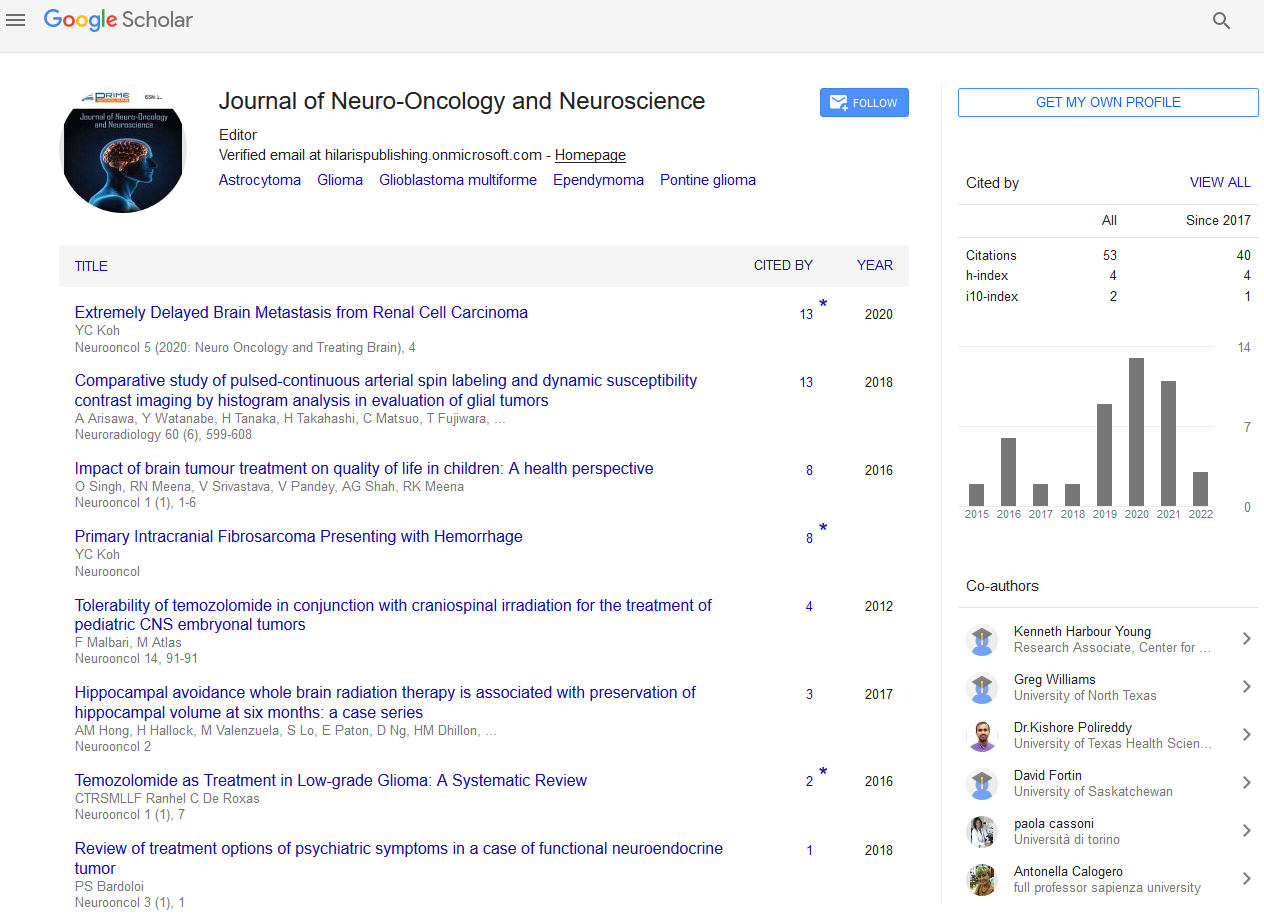Commentary Article - (2023) Volume 8, Issue 4
Unravelling the Intricacies: The Role of Stem Cells in Brain Tumour Initiation and Progression
Peter Wallstrom*
Department of Pre-Clinical Oncology, University of Nottingham, United Kingdom
*Correspondence:
Peter Wallstrom,
Department of Pre-Clinical Oncology, University of Nottingham,
United Kingdom,
Email:
Received: 29-Nov-2023, Manuscript No. IPJNO-24-19616;
Editor assigned: 01-Dec-2023, Pre QC No. IPJNO-24-19616 (PQ);
Reviewed: 15-Dec-2023, QC No. IPJNO-24-19616;
Revised: 20-Dec-2023, Manuscript No. IPJNO-24-19616 (R);
Published:
27-Dec-2023, DOI: 10.21767/2572-0376.8.4.31
Description
Brain tumors, with their heterogeneous nature and complex
microenvironment, pose formidable challenges in both
understanding their pathogenesis and developing effective
treatment strategies. Among the various cell populations
implicated in brain tumor development, stem cells have
emerged as key players, contributing to tumor initiation,
progression, and therapeutic resistance. Understanding
the role of stem cells in brain tumor biology is essential for
elucidating underlying mechanisms and identifying novel
therapeutic targets to combat these devastating diseases.
Stem cells possess unique properties, including self-renewal
and multipotency that enable them to give rise to different cell
types within the central nervous system. Within the context of
brain tumors, several sources of stem cells have been implicated
in tumor initiation and maintenance, including neural stem
cells (NSCs), cancer stem cells (CSCs), and mesenchymal stem
cells (MSCs). These stem cell populations contribute to tumor
heterogeneity and plasticity, fueling tumor growth, invasion,
and recurrence. One of the primary sources of stem cells
implicated in brain tumor initiation is neural stem cells (NSCs),
which reside in specialized niches within the adult brain, such
as the subventricular zone (SVZ) and the dentate gyrus of
the hippocampus. NSCs have the capacity to self-renew and
differentiate into neurons, astrocytes, and oligodendrocytes
under physiological conditions. However, under pathological
conditions such as brain tumor formation, NSCs can undergo
dysregulated proliferation and differentiation, contributing to
tumor growth and invasion.
Moreover, mesenchymal stem cells (MSCs), which normally
reside in the bone marrow and other tissues, have been shown
to migrate to sites of brain injury and inflammation, including
brain tumors. Once within the tumor microenvironment, MSCs
can undergo differentiation into stromal cells, such as cancerassociated
fibroblasts (CAFs), and contribute to tumor growth,
angiogenesis, and immunosuppression. Additionally, MSCs
have been implicated in promoting therapeutic resistance and
tumor recurrence through paracrine signaling and modulation
of the tumor microenvironment. The interaction between
stem cells and the tumor microenvironment plays a critical
role in brain tumor initiation and progression. The tumor
microenvironment, characterized by hypoxia, inflammation, and
dysregulated signaling pathways, provides a niche conducive to
the survival and expansion of stem cell populations. Crosstalk
between tumor cells, immune cells, endothelial cells, and
stromal cells within the tumor microenvironment orchestrates
complex signaling networks that promote tumor growth,
invasion, and immune evasion.
Understanding the molecular mechanisms underlying the
aberrant behavior of stem cells in brain tumors is essential for
developing targeted therapies that disrupt tumor-promoting
pathways while sparing normal stem cell function. Several
signaling pathways and molecular markers implicated in stem
cell dysregulation in brain tumors have been identified as
potential therapeutic targets. For example, targeting Notch
signaling, which plays a critical role in stem cell maintenance
and differentiation, has shown promise in inhibiting CSC selfrenewal
and tumor growth in preclinical models of brain
tumors. Stem cells play a multifaceted role in brain tumor
initiation and progression, contributing to tumor heterogeneity,
therapeutic resistance, and tumor recurrence. Understanding
the molecular mechanisms underlying stem cell dysregulation
in brain tumors is essential for developing targeted therapies
that disrupt tumor-promoting pathways while sparing normal stem cell function. By elucidating the intricate interplay
between stem cells and the tumor microenvironment, we can
uncover novel therapeutic targets and strategies to combat
these devastating diseases and improve outcomes for patients
with brain tumors.
Acknowledgement
None.
Conflict Of Interest
The author’s declared that they have no conflict of interest.
Citation: Wallstrom P (2023) Unravelling the Intricacies: The Role of Stem Cells in Brain Tumour Initiation and Progression. Neurooncol. 8:031.
Copyright: © 2023 Wallstrom P. This is an open-access article distributed under the terms of the Creative Commons Attribution License, which permits unrestricted use, distribution, and reproduction in any medium, provided the original author and source are credited.

